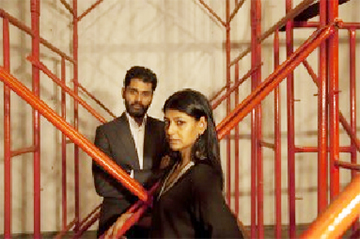Nandita Das might be one of the few Indian actors known outside of India, but she isn’t sure that she wants to be identified as an actor. Currently on a four-month fellowship at Yale University, Das has myriad interests besides acting and directing, the latest of which is CinePlay, a new venture started by her husband, the industrialist Subodh Maskara.
CinePlay aims to film and then screen Indian theatre, both online and in cinema houses, as well as use it as an education tool for students of drama and acting. In a telephone interview from the United States, Das spoke about CinePlay, why she isn’t doing too many films, and whether or not acting is a means to an end for her.
Q: You are at Yale University on a fellowship. How is that going?

A: I have been here for three-and-a-half months. It’s been wonderful. It is so nice to get out of your familiar surroundings and your comfort zone and the clutter you accumulate in your life. Also you get to interact with so many people – there is so much to learn. It’s also been a juggle, because I have my son with me, and I wouldn’t want it any other way.
We are running around, picking him, dropping him, and sometimes it is a struggle. In India we have so much help, that we get spoilt by that. You learn to appreciate it more. But there is a special kind of intimacy when you are constantly together and doing chores together. You get to know your child.
Q: Do you find the time for CinePlay then, while there is so much else going on?
A: CinePlay was really Subodh’s idea. I was initially very skeptical. I told him: how can theatre be captured? The whole idea is to perform in front of a live audience. But anytime something new comes out, we always compare it with the old, right? But if you see it afresh, you will see that it helps reach out to a much larger audience. Theatre has always had a limited, often urban and elite audience. Whether it is the location, or the cost of the ticket, or perhaps it has been viewed as an elitist activity, but theatre has not reached as far and wide as it could have. By capturing theatre on film, you can reach out to a lot more people. It also helps archive theatre. Some great plays have come and gone and there is nothing (of them).
Q: Why haven’t you done too many films in the last couple of years?
A: If you see my career graph, you will see that there is no graph really. Some years there are more films, and some years there are less films. It all depends on what I am doing with my time – and there is always lots to do. I give most of my time to advocacy work, on issues that appeal to my heart. Issues of gender inequality, issues related to children, issues related to discrimination – there is no dearth of serious issues in our country. There are so many organisations doing great work at the grassroots level, and all they need is a catalyst – to help spread the word, or just be their spokesperson.
I don’t do brand ambassadorship, because then you become associated with the brand rather than the cause. I lent my support to this campaign called “Dark is Beautiful” which got a lot of attention. I have been doing a lot of talks here, while I am at Yale, and the refrain is the same here. Whether they are Latin American or African, there is always the issue of discrimination, and colour has been one of the main forms of discrimination.Sometimes it overlaps with caste in our country, but it could be race in another country. It is a complex issue and women have been at the receiving end of this. There is much more pressure on women to look good.
